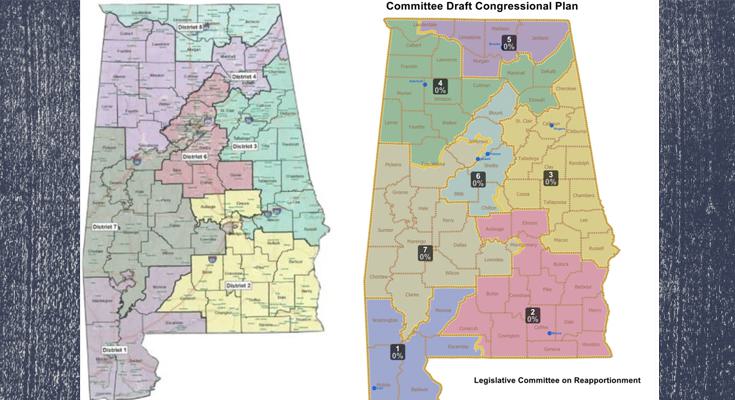By Brandon Moseley
The Alabama legislature passed all four of the redistricting bills as well as the bill for supplemental appropriation for hospitals and nursing homes, on Wednesday. However, the Republican supermajority plan for redistricting will almost certainly be challenged by Democrats in the federal courts.
The Alabama Senate passed the redistricting plan for Congress after a very long debate, and then passed the redistricting plan for the Alabama House of Representatives. The House spent hours debating whether or not it should pass resolutions condemning the Biden administration for the COVID-19 mandates, and then passed both the redistricting plans for the Alabama Senate and the State Board of Education within 10 minutes.
The Legislative Committee on Reapportionment is chaired by State Sen. Jim McClendon (R-Springville) and State Rep. Chris Pringle (R-Mobile).
McClendon was the sponsor of the two redistricting bills introduced in the State Senate. These were to redistrict the state Senate and State Board of Education. Pringle sponsored the two redistricting plans introduced in the Alabama House of Representatives. These were to redistrict the state House of Representatives and the U.S. congressional boundaries. McClendon carried both of Pringle’s bills on the Senate floor and Pringle carried both of McClendon’s on the House floor.
Most of the controversy was centered around the bill to redistrict the state’s U.S. congressional districts (HB 1).
Senate Minority Leader Bobby Singleton (D-Greensboro) said that the League of Women Voters had prepared a congressional redistricting plan of their own and wanted to know why that plan was rejected by the Legislative Committee on Reapportionment.
McClendon said that it “was a flawed plan” because it eliminated the majority-minority congressional district completely. It also put two incumbents, Mike Rogers and Gary Palmer, in the same congressional district, which is a violation of the rules that the legislature set for redistricting.
Senate Democrats introduced their own plan; but ultimately the Republican supermajority in the Alabama State Senate decided to keep the committee plan.
The U.S. Constitution requires that a new Census be held every 10 years. The decennial reapportionment and redistricting of congressional, state legislature, and state board of education districts was done based on the most recent census, in this case the 2020 census. The Census Bureau is to complete its counting of the people and have results back to the states by March of the following year. In 2010 the Obama Administration transmitted the data to the states in February 2011. This year, the numbers did not get transmitted to the states until mid-August 2021.
Election qualifying opens next month for the 2022 election, which meant that the reapportionment and redistricting plans required completion at an unprecedented speed. The plans needed to be finalized and passed by the legislature by Nov. 15.
In Alabama, the state legislature is tasked with preparing the redistricting plans. Redistricting is a very political process that often pits Republicans and Democrats against each other. In Alabama that also usually involves lawsuits by the Alabama Democratic Conference and/or the Alabama Black Legislative Caucus. In the past, they have sued in federal court asking the court to order the state to make changes to the redistricting plans passed by the legislature, and this year will be no different.
House Minority Leader Anthony Daniels (D-Huntsville) told reporters that there likely will be separate suits against more than one of the four plans. Daniels said that the biggest issues they had with the plans were dividing counties, and the packing of whites in majority-majority districts.
1819 News asked Daniels, “How did the lack of preclearance by the Biden Justice Department affect this process?”
Daniels replied, “It had an enormous effect. Honestly the Obama Administration did not do us justice 10 years ago, but I think the Biden administration would have learned from its mistakes.”
But McClendon said he is ready to defend his maps in court.
The preclearance requirement of the Voting Rights Act was ruled unconstitutional by the U.S. Supreme Court in the landmark case Shelby County v. Holder. This is the first decennial redistricting Alabama has completed without preclearance from the U.S. Justice Department Civil Rights Division since 1960.
The special session was called by Alabama Gov. Kay Ivey (R) to address redistricting and a supplemental appropriation of American Rescue Act funds. That bill, HB 3, is sponsored by State Rep. Steve Clouse (R-Ozark). It appropriates $80 million of American Rescue Act money to help Alabama nursing homes and hospitals. After the Senate passed HB 3, the Senate version, SB 3, was indefinitely carried over in the House. All five bills requested by the governor in the special session call have been passed and forwarded to the governor’s office.
The special session however is not over. On Thursday, the House will consider two bills dealing with vaccine mandates: SB 9 and SB 15. Speaker of the House Mac McCutcheon (R-Monrovia) told reporters that the two bills will be changed on the House floor. If the bills pass the House, they will be sent back to the Senate, so both chambers of the Alabama House remain in special session. Because the governor did not include vaccine mandate legislation in the call, it takes a two-thirds vote of both Houses to pass those two bills.
Thursday will be day six of the second special session of the Alabama legislature and is expected to be the last.










